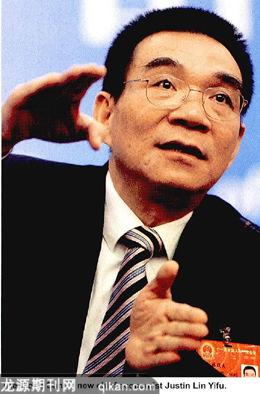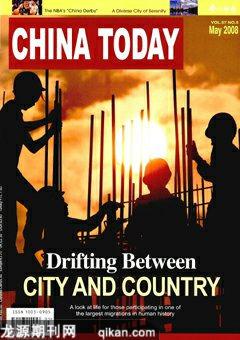The World Bank’s New Chief Economist Takes on Poverty
staff reporter ALEXANDER ANDERSON

PROFESSOR Justin Lin Yifu is nothing if not a patriot. “The main reason I returned to China was because I wanted to make a contribution to the economic development and economic transition of China,” the World Banks new chief economist once famously said while delivering a talk at the Marshall Lectures at Cambridge University in 2007.Lin was trying to explain why he left Yale in the late 1980s after spending time there as a senior research fellow, and the implication was that he could well have chosen to stay on in the West, as so many of his fellow Chinese graduate students were then doing.
On the face of it, the declaration was straightforward and unprepossessing. But the tone was unmistakable, and it hinted at a moral and intellectual tenacity – a quality he will now arguably need in ample supply – that may begin to explain the storied origins of his career.
Retold any number of times, the legendary tale of Justin Lins dramatic departure from Taiwan in 1979, when he swam across two kilometers of open ocean to reach the mainland, has inevitably included its share of embellishments. In one notable version, he was even said to have used two basketballs as flotation devices, though his wife recently insisted the 55-year-old Lin, to this day an enthusiastic and powerful swimmer, would not have needed any help.
Regardless of the details, that he fled to the Chinese mainland in the wake of the “cultural revolution,” took a degree in Marxist economics at Peking University, studied in Chicago under Milton Friedman and returned home to become Chinas leading economist singles him out as a most atypical candidate for a leading role at the World Bank.
To hear the banks President Robert Zoellick explain it, however, the choice was a perfectly sensible one. “As our first chief economist from a developing country, and an expert on economic development and particularly agriculture, Justin Lin brings a unique set of skills and experience to the World Bank Group,” he said in announcing the decision.
With characteristic modesty, Lin agreed, telling the news agency Xinhua: “Chinas experiences can help the World Bank shore up its leading role in global poverty reduction. This appointment is a high honor, and its a historic decision for the World Bank. By picking a candidate from China, the World Bank will be able to better serve developing countries.”
Considering the momentous economic and social transformation China has lived through in the last 30 years, that characterization must rank as the epitome of understatement, but the broad outline of his life story can indeed be summarized by those two simple words – poverty reduction.
As he told reporters on the sidelines of the Chinese National Peoples Congress, which convenes annually in March and which he attended this year as a deputy: “The World Bank and China share the same position on the poverty alleviation issue. The goal of the World Bank is to help developing nations fight poverty. China also hopes other nations can find practical solutions to their problems, just like it is doing.”
Professor Lin will take up his World Bank tenure at a time when that institutions traditional approach to poverty alleviation has come under withering scrutiny and criticism from all quarters. Increasingly derided in recent years for its emphasis on painful structural readjustments to the detriment of the worlds marginalized populations, the bank has, to its credit, lately been exploring alternative solutions to the problem of entrenched poverty.
In choosing the Chinese economist, World Bank President Robert Zoellick said he would be drawing on Lins expertise, notably in agricultural policy, to bring more effective remedies to bear in the worlds most impoverished regions. “I look forward to working closely with him on a number of areas, including growth and investment in Africa, opportunities for South-South learning (between developing countries), and bank instruments to better support countries hit by high energy and agricultural prices,” Zoellick said.
Lin, for his part, has noted that the diminishing reliance of poorer nations on direct financial assistance will mean that the World Banks most important role in coming years will be as a repository of relevant expertise. “Knowledge has the trait that it will not be diminished when being applied by one or more persons,” he said during the National Peoples Congress. “A few days ago, I heard Premier Wen quote George Bernard Shaw: ‘If you and I both have an apple, and we exchange them, we still have one apple each. But if we exchange the knowledge we have respectively, the amount of knowledge we get will double. Fortunately, my job with the World Bank deals with the creation and exchange of knowledge.”
The World Bank, he said, needed a thorough understanding of the challenges faced by developing nations, and that therein lay the significance of choosing a chief economist from a developing nation like China. “The World Bank can help developing countries by offering expertise. This is what makes it different from other financial institutions,” he said.
The theoretical underpinnings of what will likely be Lins recommendations to the World Banks board have a long pedigree, and he has addressed his preoccupations in countless papers. But he formulated his central theme most succinctly at the 116th Changan Forum in Beijing in March 2007, arguing that the view held by traditional economists – that equity and efficiency belonged to separate stages of a nations development – was fundamentally misguided.
Rather than accept low wages as the inevitable price to be paid for greater efficiency in the initial stages of a countrys economic development, with more equitable resource and capital distribution to come later, Lin argued that without greater attention to equity from the start, any future development would be severely compromised. The experiences of nations such as Japan, the Republic of Korea and Singapore, he maintained, demonstrated that development was more sustainable if income distribution attended economic development from the outset.
Drawing on the classic theory of comparative advantage, which argued that trading nations must invest precisely in those sectors in which they predominate, Lin recommended that developing economies eschew capital-intensive investments in favor of the labor-intensive manufacturing and service industries in which they enjoy preeminence. “Only after we have a surplus can we accumulate capital,” he said. For developing countries, their comparative advantage lay in large workforces, and only by investing in labor, rather than capital-intensive industries, could long-term growth be made sustainable and income gaps ultimately narrowed.
But it is a position that stands in stark contrast to past World Bank policies, which have been sadly notorious for encouraging so-called “white elephants” – monumental, technically sophisticated projects in economically backward societies. Often, the resulting need for international subsidies to compensate for inevitable capital deficits plunged developing nations into a spiral of debt and default. It will now be Lins task to formulate an alternative to that discredited approach.
Still, it is one thing to have a workable theory, and quite another to take on an entrenched culture such as the one that informs the lending policies of an international institution. Indeed, as Lin arrives in Washington D.C. and moves into the World Bank headquarters on 18th Street, he may notice the small public square just outside the building – a pleasant little triangular park called Freedom Plaza where office workers may be seen taking their lunch.
As he is bound to discover soon, perhaps to his chagrin, it is also the site of annual demonstrations against the policies of his new employer, and as he begins confronting the many intractable problems faced by the worlds poorest nations, he will surely need all the endurance he demonstrated nearly 30 years ago in the East China Sea.

